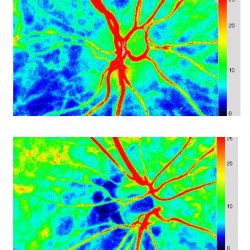Aging
Three Study Summaries on Omega-3 Fatty Acids for Chronic Disease
Below are three peer-reviewed studies showing the benefits of Omega-3 fatty acids in addressing chronic diseases, including rheumatoid arthritis, cognitive impairment, and non-alcoholic fatty liver disease. Study 1: DHA, EPA, and GLA for Rheumatoid Arthritis Researchers evaluated the effects of supplemented marine polyunsaturated fatty acids (PUFA) supplying DHA and EPA,Read
Infrared Light Irradiation on Retinal Artery, Vein Blood Flow & Atherosclerosis-inducing Factors
In this small pilot study, published in Integrative Medicine Research (Dec. 2017), researchers evaluated the influence of pinpoint plantar long-wavelength infrared light irradiation (stress-free therapy; SFT) on chorioretinal hemodynamics (retinal artery and vein blood flows) as well as its influences on atherosclerosis-inducing factors (triglycerides; TG, low-density lipoprotein cholesterol; LDL-C, high-densityRead
Fasting Mimicking Trial Shows Promise for Chronic Disease Reduction
Fasting is more than a popular diet fad, according to a recently released University of Southern California Davis study. A five-day fast once a month could reduce one’s risk of life threatening diseases and result in weight loss. For 71 adults, participating in a fasting-mimicking” phase II trial at theRead
Over-the-Counter Pain Meds Associated with Hearing Loss
One of every three people age 65 reports some level of hearing loss. Evidence is growing that over the counter pain relievers may account for some of hearing loss in these older Americans. A new study, from the American Journal of Epidemiology, shows that six more years of use ofRead
Doctors Rethink Calcium and Fracture Risk Advice
Doctor’s hardened advice to take calcium to prevent age-related fractures is softening. Two studies in the British Medical Journal released in October 2015, shows that increasing calcium intake through dietary sources or supplements does nothing to improve bone health or prevent fractures in older people. The studies suggest that increasingRead
Newly Found Lymphatic System Connects Brain & Immunity
You can forget everything you learned in medical school about the lymphatic system (well, not everything). But researchers at the University of Virginia found undiscovered vessels that directly connect the brain and lymphatic system, as published in Nature. Despite decades of contrary opinions they did not exist, this changes everythingRead
New MIND Diet Protects Against Alzheimer’s Risk by 53%
A specially designed diet for the brain, with even moderate adherence, shows reduction in incidence of Alzheimer’s disease by as much as 53%. The new diet, known as MIND, was reported in the most recent issue of Alzheimer’s & Dementia, the Journal of the American Alzheimer’s Association in March, 2015.Read
Lomatium Dissectum Inhibits CXCL10, Linked to Influenza A
The Journal for Restorative Medicine shows that Lomatium dissectum may provide an option to for integrative care specialists for influenza A. The plant is native to the Western US and is traditionally used in the Native American culture to treat influenza. During the 1918 flu epidemic, it was reported thatRead
Mechanism for Calorie Restriction Discovered
A new study led by Harvard School of Public Health (HSPH) researchers identifies a key molecular mechanism behind the health benefits of dietary restriction, or reduced food intake without malnutrition. Also known as calorie restriction, dietary restriction is best known for its ability to slow aging in laboratory animals. TheRead













